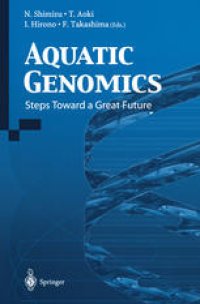
Ebook: Aquatic Genomics: Steps Toward a Great Future
- Tags: Zoology, Animal Genetics and Genomics
- Year: 2003
- Publisher: Springer Japan
- Edition: 1
- Language: English
- pdf
In a scientific pursuit there is continual food for discovery and wonder. M. Shelley (1818) Genomic analysis of aquatic species has long been overshadowed by the superb activity of the human genome project. However, aquatic genomics is now in the limelight as evidenced by the recent accomplishment of fugu genome sequencing, which provided a significant foundation for comparative fish genomics. Undoubt edly, such progress will provide an exciting and unparalleled boost to our knowl edge of the genetics of aquatic species. Thus, aquatic genomics research has become a promising new research field with an impact on the fishery industry. It is notewor thy that the Food and Agriculture Organization (FAO) of the United Nations has projected that current global fisheries production will soon become insufficient to supply the increasing world population and that aquaculture has a great potential to fulfill that demand. This book, Aquatic Genomic. ~: Steps Toward a Great Future, was designed as a collection of advanced knowledge in aquatic genomics and biological sciences. It covers a variety of aquatic organisms including fish, crustaceans, and shellfish, and describes various advanced methodologies, including genome analysis, gene map ping, DNA markers, and EST analysis. Also included are discussions of many sub jects such as regulation of gene expression, stress and immune responses, sex differ entiation, hormonal control, and transgenic fishes.
The recent progress achieved in aquatic genomics research has important implications in science and aquaculture. Researchers' success in genome sequencing of the fugu has provided a foundation not only for comparative fish genomics but also for genetic studies of other vertebrates. This volume, with contributions by leading scientists from around the world, provides the latest information on genomic studies of a variety of aquatic organisms including fish, crustaceans, and shellfish, with descriptions of such methodologies as genome analysis, gene mapping, DNA markers, and EST analysis. Other topics include regulation of gene expression, stress and immune responses, sex differentiation, hormonal control, and transgenic fish. This book is a valuable resource for all scientists whose work involves aquatic organisms, especially for those in the fields of aquatic genomics, fish immunology, and aquatic biotechnology.